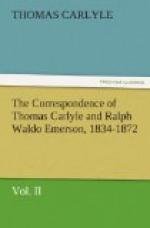Now at home again, I read English Newspapers, with all the world, and claim an imaginary privilege over my compatriots, that I revolve therein my friend’s large part. Ward said to me yesterday, that Carlyle’s star was daily rising. For C. had said years ago, when all men thought him mad, that which the rest of mortals, including the Times Newspaper, have at last got near enough to see with eyes, and therefore to believe. And one day, in Philadelphia, you should have heard the wise young Philip Randolph defend you against objections of mine. But when I have such testimony, I say to myself, the high-seeing austerely exigent friend whom I elected, and who elected me, twenty years and more ago, finds me heavy and silent, when all the world elects and loves him. Yet I have not changed. I have the same pride in his genius, the same sympathy with the Genius that governs his, the old love with the old limitations, though love and limitation be all untold. And I see well what a piece of Providence he is, how material he is to the times, which must always have a solo Soprano to balance the roar of the Orchestra. The solo sings the theme; the orchestra roars antagonistically but follows.—And have I not put him into my Chapter of “English Spiritual Tendencies,” with all thankfulness to the Eternal Creator,—though the chapter lie unborn in a trunk?
’T is fine for us to excuse ourselves, and patch with promises. We shall do as before, and science is a fatalist. I follow, I find, the fortunes of my Country, in my privatest ways. An American is pioneer and man of all work, and reads up his newspaper on Saturday night, as farmers and foresters do. We admire the [Greek], and mean to give our boys the grand habit; but we only sketch what they may do. No leisure except for the strong, the nimble have none.—I ought to tell you what I do, or I ought to have to tell you what I have done. But what can I? the same concession to the levity of the times, the noise of America comes again. I have even run on wrong topics for my parsimonious Muse, and waste my time from my true studies. England I see as a roaring volcano of Fate, which threatens to roast or smother the poor literary Plinys that come too near for mere purpose of reporting.
I have even fancied you did me a harm by the valued gift of Antony Wood;—which, and the like of which, I take a lotophagous pleasure in eating. Yet this is measuring after appearance, measuring on hours and days; the true measure is quite other, for life takes its color and quality not from the days, but the dawns. The lucid intervals are like drowning men’s moments, equivalent to the foregoing years. Besides, Nature uses us. We live but little for ourselves, a good deal for our children, and strangers. Each man is one more lump of clay to hold the world together. It is in the power of the Spirit meantime to make him rich reprisals,—which he confides will somewhere be done.—Ah, my friend, you have better things to send me word of, than these musings of indolence. Is Frederic recreated? Is Frederic the Great?




